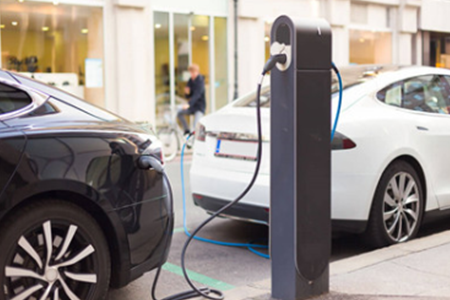Calculating the total cost of installing a home charger for an electric vehicle (EV) may seem like a lot of work, but it’s worthwhile. After all, recharging your EV at home will save you time and money.
According to Home Advisor, in May 2022, the average cost to get a Level 2 home charger installed in the United States was $1,300, including the cost of materials and labor. The type of home charging unit you purchase, available incentives, and the cost of professional installation by a licensed electrician all factor into the total price. Here are some things to consider when installing a home EV charger.
Choosing a Home Charger
The most common method of charging at home is a wall box unit. Prices for these home EV chargers range from $300 to well over $1,000, not including installation costs. All Level 2 charging units, purchased either from the dealer when you buy your EV or from an independent seller, can charge any new EV. Charging a Tesla EV may require an adaptor for your home unit unless you buy one that uses the automaker’s proprietary connector. Prices vary based on features such as Wi-Fi connectivity and weather protection for chargers installed outside. The length of the cable and the type of data the unit can track (such as the amount of energy used) also impact the unit’s cost.
Be sure to pay attention to the unit’s maximum amperage. While higher amperage is usually better, EVs and your home electricity panel are limited in how much electricity they can accept and deliver. Wallbox sells multiple versions of its home charger, for example. The 48-amp version costs $699—$50 more than the 40-amp model’s price of $649. Don’t spend extra buying a unit with a higher-amperage rating than your setup can handle.
Hardwired vs. Plug-In
If you already have a 240-volt electrical outlet where you will park your EV, you can easily purchase a plug-in charging unit. If you don’t already have a 240-volt outlet, you still might choose a home charging wall unit that plugs in instead of having a hardwired unit installed. Hardwired units are usually cheaper to install than a new plug, but they’re not always more affordable to purchase. For example, MIDA’s Home Flex charger costs $200 and can be hardwired or plugged in. It also offers flexible amperage settings from 16 amps to 50 amps to help you select the correct number for your EV.
The main benefit of a plug-in unit is that you can easily upgrade your home charging system without needing to call an electrician again. Upgrading should be as simple as unplugging your plug-in unit, detaching it from the wall, and plugging in a new unit. Repairs are also easier with plug-in units.
Electrician Costs and Permits
The basics of installing a home charging unit will be familiar to any licensed electrician, which makes it a good idea to request estimates from multiple local electricians. Expect to pay an electrician between $300 and $1,000 to install your new charger. This figure will be higher if you must upgrade your home electricity panel to charge your new EV properly.
Some jurisdictions require a permit to install an EV charging unit, which could add a few hundred dollars to the cost of your installation. Your electrician can tell you if a permit is required where you live.
Available Incentives
The federal incentive for home charging units has expired, but some states and utilities still offer rebates of a few hundred dollars to install a home charger. Your EV dealer should be able to tell you if the automaker offers any incentives, as well. Chevrolet, for example, gives buyers of the 2022 Bolt EV or Bolt EUV a $250 credit toward installation permit fees and up to $1,000 toward device installation.
Do You Need a Home Charger?
If you have a 240-volt outlet near where you will park your EV, you might not need to install a home charging unit. Instead, you can simply use an EV charging cable. Chevrolet, for example, offers a Dual Level Charge Cord that functions as a regular charging cord for a standard, 120-volt outlet but can also be used with 240-volt outlets and will charge your EV as fast as some wall boxes.
If your EV doesn’t come with a charge cord, you can buy similar ones for around $200, but not all are dual-use. You can keep charge cords like these in the car for use when you’re not at home. Note, however, that they will only charge as rapidly as a Level 2 charger when connected to a 240-volt outlet. No matter what charging unit you use, a standard 110-volt outlet will only provide around 6-8 miles of range an hour.
Summary
Installing a home EV charger is often not much more difficult or expensive than getting a new 240-volt outlet for power tools or an electric clothes dryer. As more EVs hit the road, more electricians will gain experience installing chargers, making them even more accessible in the future. If you’re ready to learn more about living with an EV, check out our Shopping Guides section.
Post time: Oct-26-2023

 Portable EV Charger
Portable EV Charger Home EV Wallbox
Home EV Wallbox DC Charger Station
DC Charger Station EV Charging Module
EV Charging Module NACS&CCS1&CCS2
NACS&CCS1&CCS2 EV Accessories
EV Accessories

